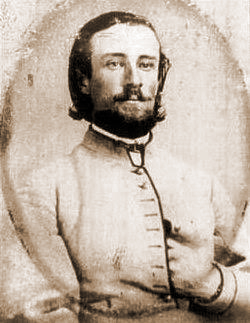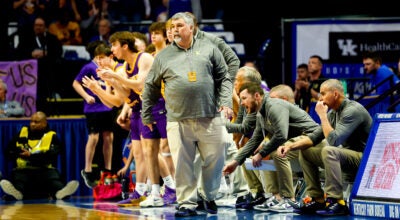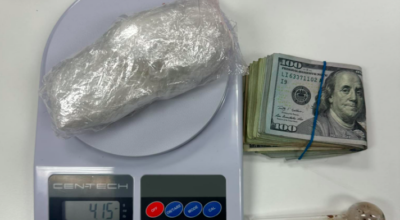Samuel “One-Armed” Berry: Conclusion
Published 10:26 am Tuesday, May 30, 2023

- Sam Berry
This is the second in a two-part series
By BRYAN BUSH
Perryville Battlefield State Historic Site
One of the most interesting raids occurred in December of 1864. Twelve gang members, including Jerome “Sue Monday” Clarke, Sam Berry, and Dick Mitchell, started on a raid of robbery and murder. The gang first visited Springfield, Kentucky, robbed the stores and private individuals of about two thousand dollars in money and property. The gang members shot and killed T. W. Lee, a wagonmaker, and a gentleman named Wetherton, a shoemaker. After robbing Springfield, the gang rode to Texas and Pottsville and robbed the towns of a small amount of money. Just after dark, the town of Perryville was informed that about one hundred guerillas were headed in their direction by the way of Mackville Road. The news threw the town into panic. The citizens of Perryville kept watch over the town during the night. The towns folk were not armed and came to conclusion that if the force was too large the town would not be able to offer any resistance.
At 2 p.m., the next day Sue Munday, along with Berry, and the other twelve gang members stormed into town. At the time, about 200-300 people in Perryville were in the streets of Perryville going about their daily business, when the gang came riding in from the west and yelling loudly: “Fall in line or be shot down.” A large number of Perryville residents jumped into the bushes. Dick Guthrie was standing in the blacksmith shop. He had a lot of money in his pockets and fearing that the gang would take his money hid under the forge.
Harvey Walker hid in the cave on the Karrick-Parks house. About 100 of the residents lined up directly opposite the Enterprise Hotel and were robbed, one by one at gun point.
Everyone was relieved of their purses. Most of the gang never dismounted and rode up to the store doors and made the merchants bring them the contents of their cash drawers. One of the gang members, who was a large 6-foot gentleman, dismounted and rifled the pockets of the line of men, all of whom had their hands in the air. Money was the sole object of the raid. The gang members also took several horses and saddles. Dashing across the bridge, Berry rode his horse into Wallace Green’s drugstore, and took all the money from the cash drawer and rode out.
When the raiders entered the next store, which was a grocery store, and the clerk was W. H. Parks. They thought they were about to be attacked by a young Federal soldier by the name of John Lawson. He was shot and mortally wounded while in the act of handing over his wallet.
The gang member who shot the Federal soldier stated that he shot the soldier by mistake.
Richard Lester, who was in the rear of the store, jumped out the back window, and into the Chaplin River. He swam across the river and hid in the tall woods on the Wingate farm east of town, where he remained for three days without food before returning to town. The gang members were going to kill Lester because he had been discourteous to the gang members on a previous raid. The gang next entered the store of Peg Leg Jones, a local merchant. Jones had just opened his store, having moved from Harrodsburg just a few days before the raid. Henry McGraw, who lived in Perryville, was an uncle of Sam Berry and his appearance on the scene prevented a further attack on the town. The gang stayed in the town for only twenty minutes.
From Perryville, the gang rode onto Nevada and Cornishville. They were headed towards Bloomfield. About an hour after the raid, Federal Captains Fiddler and Wharton, from Lebanon, in command of a detachment of thirty-five soldiers and armed citizens, arrived and were in hot pursuit of the gang members. While looking for the gang members, they ransacked homes and businesses and taking horses. Some of the citizens were repaid for their horses.
In February 1865, Jerome Marcellus Clarke and Henry Magruder was captured and tried.
Henry Magruder and Jerome Marcellus Clarke were both hung in Louisville. Sue Mundy’s body was taken to Simpson County, his home, and buried in a small cemetery, but on August 11, 1914, a delegation from the Confederate Veterans in Simpson County, and relatives and friends of Jerome Clarke went to the country graveyard and reinterred him in the Greenlawn Cemetery in Franklin County, Kentucky. Big Zay Coulter was killed in Spencer County near the end of the war, and Dick Little went to Mississippi, was elected sheriff, and killed in a riot. Berry formed a new gang and added rape to his long list of crimes.
On December 8, 1865, Sam Berry, along with the rest of his gang, surrendered to Union Major Wilson’s detachment of mounted infantry and taken to Louisville and tried before a military court. In January 1866, Berry’s trial began and lasted several weeks. The presiding judge was Union General Jefferson Davis. Berry was found guilty on February of 1866. He was convicted of seven murders and the charge of being a guerilla. The sentence of the military court was approved by Military District Commander Union General John Palmer. On March 3, 1866, Berry was to be executed in the yard of the military prison on the corner of 10 th and Broadway Streets. 9
On March 7, 1866, under General Court Martials No. 21, the death sentence in the case of Sam Berry, under Court Martial Orders N. 11, Feb. 10, 1866, was commuted to a 10-year sentence with hard labor in the penitentiary at Albany, New York.
Only seven years into his sentence, Sam Berry died on July 4, 1873. He was only 34 years old. There are varying reports on how Berry died while in prison. One report stated he was punished by being placed beneath a small and constant stream of cold water, which poured over his head and down his spinal column and he died from his torture. Another report stated he died of tuberculous and was buried in the prisoner’s section of the Albany Rural Cemetery.
Bryan Bush is park manager of Perryville Battlefield State Historic Site.






